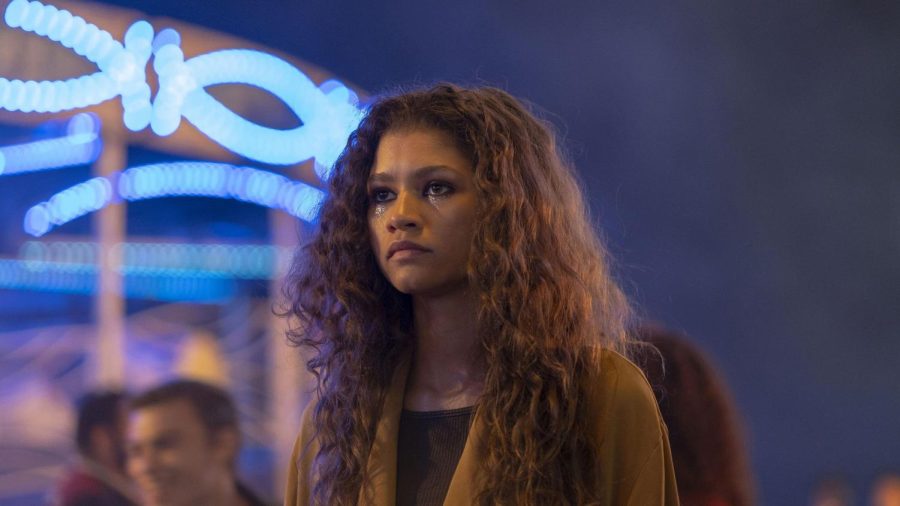Opinion: HBO’s “Euphoria” represents the heart-wrenching and raw struggles of today’s teens
February 1, 2022
“Euphoria” is an American teen drama series available on the streaming service known as HBO Max. The show follows a group of individual high school students walking the path of self-identity, trauma, addiction and drug abuse all while trying to create and maintain worthwhile relationships. Season Two of the series has been releasing episodes weekly since Jan. 9, 2022, after an absence of two and a half years due to the COVID-19 pandemic.
The intense and thought-provoking series has gathered around 3.6 million viewers from around the world. With anticipation to understand the characters deeper and watch their lives play out –whether it be from self-destruction or discovery– audiences have had expectations for the new season to be just as impactful as the last.
Although “Euphoria” may be too intense for some viewers, I believe that the confrontation of core issues that occur in the show are insightful and filmed in an articulate way to fully encapsulate the different challenges that the characters face. “Euphoria’s” genre of ‘teen drama’ does not wholly fulfill the raw representation of societal taboos that need to be listened to rather than shrugged off. “Euphoria” is much more than a show, it is a portrayal of the sensibility hidden in our souls.
A character I am fond of because of how they display the intense adversities of drug abuse, addiction and mental illness is Rue who is played by Zendaya. In the first season, she was introduced as a high school student who is sent to a rehabilitation center, yet has no motive to leave the drugs she had previously used to cope with her struggles when she returns back home. Some of the most prominent issues that Rue faces are generalized anxiety disorder (GAD), obsessive-compulsive disorder (OCD), major depressive disorder (MDD), addiction and grief. Her grief built itself into a drug addiction, which then manifested into an unbreakable, threatening cycle of ‘coping’. When hopelessness and overbearing emotions tackled her mercilessly, she needed an escape from the thoughts that reign on her mind even if her method is killing her slowly.
A scene that depicts the beginning of her heart-tearing suffering clearly was a memory of 14-year-old Rue lying next to her father who is grasped by the silent choke-hold of cancer. She stands by him, afraid that she may lose the connection she has with him; then, she tries her first dose of oxycodone that was given to her father to reduce his pain, but she learns that it lessens the weight-bearing on her mind. Her father passes away, and the grief built into her system branches into a fear of losing loved ones. This fear follows her into future relationships, especially with Jules who is played by Hunter Schafer. Her first encounter with Jules becomes a psychological analysis of how Jules is vulnerable and hurt since Rue can empathize with the way she is feeling. As their relationship progresses, it seems as if there is a dependency for Jules to stay with Rue due to Rue not wanting anyone else to leave her. Because of the dependency, they are both brought into toxicity as their relationship is based on their emotional patterns rather than sentiment. They both simply wish to be understood by anyone.
I will give “Euphoria” credit for being distinctive, but the one thing that perplexes me is the age range that it occurs in. I feel as if the struggles are more comprehensive in college students compared to high school students. Though these problems may occur to high school students, the process of development from teenage-hood to adulthood is too quick to understand truthfully, meaning that the self-induced pressure to seek out any distraction to swim out of the deep end will only cause more self-inflicted pain; therefore it’s more realistic to young adults.
“Euphoria” is a beautifully written and filmed character-driven series that describes the pain that transcends into a world of heartbreak and illness. There is a stylistic motive created by the writers and directors that makes the show appealing through how much audiences can sympathize with the characters. It’s an honest and raw portrayal of the emotions and struggles the population goes through, as well as the hardships of navigating the rest of our lives. Although some viewers may find the show’s content explicit and romanticized, it may be a good conversation for teenagers to prepare for the issues that may arise.
Drug Abuse Hotline: 1-800-662-4357
Suicide Hotline: 1-800-273-8255









